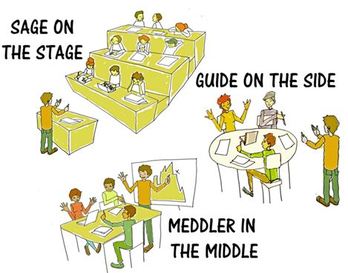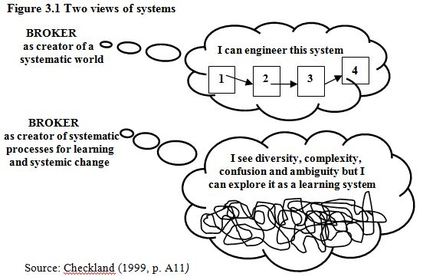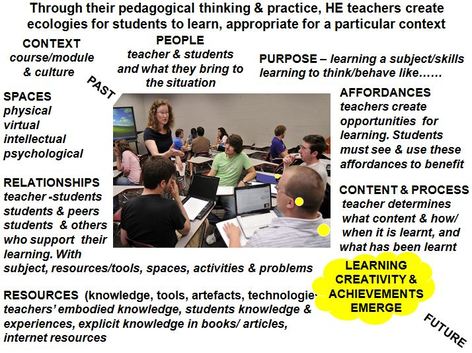
EXPLORING PERSONAL PEDAGOGY
DAY 2 Tuesday March 28
Today's challenge is to use the idea of metaphor to explore the underlying orientations, qualities and characteristics of a personal pedagogy. Our choice of metaphors are very likely to engage with deeply held beliefs and values about the way we help and enable others to learn. What metaphor(s) might you use to describe your own pedagogical thinking and practice and why you choose the(se) metaphor(s)?
I have come to the conclusion that experienced teachers need a bag full of metaphors to embrace the range of thinking and practices we employ as a teacher. For example almost any protracted experience of encouraging and helping others to learn will involve Erica McWilliam's trilogy of 'sage' 'guide' and 'meddler'. Just recently, when thinking about how teachers encourage learners to use their creativity I developed the idea of instigator which seemed to fit some of the work we are doing with #creativeHE where the teacher get things going and then 'get out of the way'. All too often teachers do not get out of the way yet this is key to enabling other people's creativity to flourish and I must confess there are lots of situations where I don't get out of the way.
I could list many more metaphors that might help reveal ways that encourage and help others to learn, but I will focus on two that seem to explain the way I think and act pedagogically - at least in my current context.
DAY 2 Tuesday March 28
Today's challenge is to use the idea of metaphor to explore the underlying orientations, qualities and characteristics of a personal pedagogy. Our choice of metaphors are very likely to engage with deeply held beliefs and values about the way we help and enable others to learn. What metaphor(s) might you use to describe your own pedagogical thinking and practice and why you choose the(se) metaphor(s)?
I have come to the conclusion that experienced teachers need a bag full of metaphors to embrace the range of thinking and practices we employ as a teacher. For example almost any protracted experience of encouraging and helping others to learn will involve Erica McWilliam's trilogy of 'sage' 'guide' and 'meddler'. Just recently, when thinking about how teachers encourage learners to use their creativity I developed the idea of instigator which seemed to fit some of the work we are doing with #creativeHE where the teacher get things going and then 'get out of the way'. All too often teachers do not get out of the way yet this is key to enabling other people's creativity to flourish and I must confess there are lots of situations where I don't get out of the way.
I could list many more metaphors that might help reveal ways that encourage and help others to learn, but I will focus on two that seem to explain the way I think and act pedagogically - at least in my current context.

'BROKER'
The first is that of a 'broker' and it reflects both current and past circumstances of my life - I do not practice as a teacher in a university but I do try to engage others in learning processes like the #creativeHE conversation through which they can learn. I developed the idea of a broker many years ago while working in a number of HE agencies (HEQC, QAA, LTSN & HEA) where my job was build networks and engage people in social learning in order to develop the knowledge I needed to research a topic, develop policy or share and develop practice.
The idea intrigued me so much that I wrote a book exploring its meanings and interpreting my and others practices through the brokerage lens. I wrote 'brokerage is a tool for engaging socially complex communities. The idea of engagement extends from drawing someone into conversation to encourage them to think about something, to systematically drawing many people or an entire community into discussion and perhaps action. It is fundamental to change where there are lots of different interests involved and complex negotiations are required in order to share perspectives and advance thinking about what needs to be done. I drew this picture in book which I guess reveals my fundamental orientation as a teacher. I see myself as a creator of processes that can explore the potential (affordance) of a situation for learning - an idea that I returned to and developed over a decade later in the idea of learning ecologies.
There is no simple definition of brokerage because perceptions of meaning are context dependent. For example:
I carry this idea and these sorts of practices with me in my everyday work for Lifewide Education & Creative Academic
The first is that of a 'broker' and it reflects both current and past circumstances of my life - I do not practice as a teacher in a university but I do try to engage others in learning processes like the #creativeHE conversation through which they can learn. I developed the idea of a broker many years ago while working in a number of HE agencies (HEQC, QAA, LTSN & HEA) where my job was build networks and engage people in social learning in order to develop the knowledge I needed to research a topic, develop policy or share and develop practice.
The idea intrigued me so much that I wrote a book exploring its meanings and interpreting my and others practices through the brokerage lens. I wrote 'brokerage is a tool for engaging socially complex communities. The idea of engagement extends from drawing someone into conversation to encourage them to think about something, to systematically drawing many people or an entire community into discussion and perhaps action. It is fundamental to change where there are lots of different interests involved and complex negotiations are required in order to share perspectives and advance thinking about what needs to be done. I drew this picture in book which I guess reveals my fundamental orientation as a teacher. I see myself as a creator of processes that can explore the potential (affordance) of a situation for learning - an idea that I returned to and developed over a decade later in the idea of learning ecologies.
There is no simple definition of brokerage because perceptions of meaning are context dependent. For example:
- in business, a broker is an agent, promoter, dealer, fixer, trader, someone who buys and sells;
- in politics, a broker is a diplomat, mediator, go-between, negotiator;
- in the information world, a broker is someone who knows how to access or acquire information and who provides a gateway to information resources;
- in education, a broker is a proactive facilitator who connects people, networks, organizations and resources and establishes the conditions to create something new or add value to something that already exists.
I carry this idea and these sorts of practices with me in my everyday work for Lifewide Education & Creative Academic

'ECOLOGIST'
Which for this purpose is someone who thinks about teaching and learning as an ecological (relational) phenomenon. I have been developing this idea which I have grown from my own experiences of learning and trying to achieve things and explored it through lots of writing including a book. With the benefit of hindsight I can see how the roots of this idea run back into the idea of brokerage and I could now offer a description of a broker as someone who is applying ecological thinking to their role of engaging a community. So as a teacher I am now mindful of the model I have created and when I design and animate a process to encourage, help and enable people to learn I am thinking about the things deliberately and unconsciously in this model.
References
Jackson N J (2003) Changing Higher Education through Brokerage Ashgate
Jackson N J (2017) Exploring Learning Ecologies LULU
McWilliam, E. L. (2009) Teaching for creativity : from sage to guide to meddler. Asia Pacific Journal of Education, 29(3). pp. 281-293. http://eprints.qut.edu.au/32389/1/c32389.pdf
e to edit.
Which for this purpose is someone who thinks about teaching and learning as an ecological (relational) phenomenon. I have been developing this idea which I have grown from my own experiences of learning and trying to achieve things and explored it through lots of writing including a book. With the benefit of hindsight I can see how the roots of this idea run back into the idea of brokerage and I could now offer a description of a broker as someone who is applying ecological thinking to their role of engaging a community. So as a teacher I am now mindful of the model I have created and when I design and animate a process to encourage, help and enable people to learn I am thinking about the things deliberately and unconsciously in this model.
References
Jackson N J (2003) Changing Higher Education through Brokerage Ashgate
Jackson N J (2017) Exploring Learning Ecologies LULU
McWilliam, E. L. (2009) Teaching for creativity : from sage to guide to meddler. Asia Pacific Journal of Education, 29(3). pp. 281-293. http://eprints.qut.edu.au/32389/1/c32389.pdf
e to edit.
 RSS Feed
RSS Feed